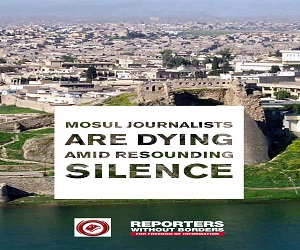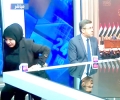
At a time when journalists are still being attacked and violated across the country and where they have been the target of concerted efforts to stifle press freedom and free speech, the Iraqi Parliament is re-introducing the information crimes law. This law is controversial because it contains articles and paragraphs that limit freedom of expression on social media and media.
The law, initially proposed in the session (2010-2014) and then withdrawn and reinstalled in the previous parliamentary session, has several articles that, in the end, impose a gag order on people who talk about essential concerns impacting public life in Iraq.
The Journalistic Freedoms Observatory (JFO) issued a detailed analysis in 2020 that pointed out loopholes in the law made possible by the widespread availability of articles using vague and ambiguous wording.
There are a total of 31 articles in the Information Crimes Law, and each of those contains several subsections; sentences of up to 30 years in prison and penalties of up to 100 million Iraqi dinars are outlined in the bulk of the subparagraphs.
Experts say that the proposed bill's second chapter has severe criminal consequences that may not exist in the laws of other countries. The term "life imprisonment" appears many times in Articles 3, 4, and 6, covering a wide range of crimes for which it is not warranted. An extreme punishment may look like this: "disseminating false or misleading information with the intent to damage trust in the electronic financial system or electronic commercial and financial publications and the like, or to harm the national economy and the financial confidence of the state."
The law allows authorities to punish bloggers and journalists for violations such as establishing fake internet identities, failing to differentiate between criticism and insulting public figures and institutions, and restricting access to information and the freedom to publish, especially in corruption cases.
The law allows authorities to punish bloggers and journalists for violations such as establishing fake internet identities, failing to differentiate between criticism and insulting public figures and institutions, and restricting access to information and the freedom to publish, especially in corruption cases.
The law also contains provisions that could be interpreted as criminal penalties for certain types of speech, including criticism of economic and financial policies and pointing out flaws or deficiencies in those policies. This could be the case, for example, if a security officer were to use excessive force against a citizen, prisoner, or demonstrator. The same holds for instances of corruption that have happened or will occur in the future.
It is noteworthy that Iraq placed 157th in the world according to Transparency International's Corruption Perceptions Indicators for 2021.
The effort to enact the information crimes law has followed an aggressive push against press freedoms over the last several years. Ahmed Abdel Samad and his photographer, Safaa Ghala, were murdered in Basra Governorate, southern Iraq, at the start of 2020. In Baghdad, the well-known security expert Hisham Al-Hashemi was murdered, while the journalists Tawfiq Al-Tamimi and Mazen Latif were abducted. All of this comes in addition to burning the offices of local and international media outlets functioning in Iraq and harassing and threatening their employees, causing some of them to flee their towns or relocate to other countries.
The former chairman of the Iraqi Integrity Commission, Judge Rahim Al-Agili, has previously described the proposed law as "very dangerous" and warned that it would be "a significant breach in freedom of speech and a lethal spear in the government's hands to attack any speaker or opinion-maker."
Al-Agili makes it clear that "the criticism does not view the law as an asset since this would put us all under the bayonets of tyranny, arbitrariness, oppression, and abuse in the name of the law." He also notes that "the importance of the law does not imply acceptance of its use as a pretext for confiscating liberties and silencing voices."
Despite controversy and protests, the parliament completed the first reading of the information crimes law during its session on Monday, November 21, 2022.
Ali al-Tamimi, a security specialist, said, "The proposed law did not provide a clear distinction between critique and criticism, which is crucial given the increasing use of social media, while the Penal Code clearly differentiated between insulting, slander, and defamation."
He said, "There are separating lines between critique and criticism that must be distinguished with precision, and the criteria between the two is everything that constitutes a crime."
As an amendment to Law 65 of 2004, a specific unit should be formed inside the Media and Communications Authority in order to oversee social media, he said. This unit contains a number of media and legal experts who watch what is published. It is connected to the Executive Director of the Authority, and in the case of a crime, it is reported to the court with the closest territorial jurisdiction to the commission. This control is also connected to a second security agency from which it gets data.
Human Rights: The proposal undermines the right to free speech.
Human Rights Watch issued a statement on May 8, 2021, stating that the law permits Iraqi authorities to prosecute anyone who publishes content on social media or the Internet that does not conform to the authorities' vision if the content is deemed a threat to government, social, or religious interests.
The New York City, United States-based organization, verified that the draft law established "the prospect of penalizing dissent in civil society," stressing that the proposed law also recommended outer limits on electronic communications. Heavy penalties and minimum jail terms, a component of the law, might make it more difficult for individuals to express themselves.
"Renewal and reminder"
A decade ago, the Journalistic Freedoms Observatory (JFO) opposed the "information crimes" law, which was abolished in 2013 at the suggestion of Ali Al-Shalah, the former chairman of the Culture and Information Committee on behalf of the State of Law Coalition. Today, we reiterate our opposition to this law's introduction. once again.
In light of the extensive conversation on social media about the political situation in the country following the October 2019 demonstrations, in which many political leaders took a critical attitude against it, JFO implies that the "information crimes" law was pushed into legislation.
JFO has announced that any member of Parliament who supports the passage of the "informatics crimes" law would be placed on a black-list compiled by the Observatory and monitored by international human rights organizations.
In recent years, the Journalistic Freedoms Observatory (JFO) has identified information control and press freedom limitations implemented by civilian and military state agencies. Through prolonged efforts, these institutions have endeavored to put limitations on the flow of information and the domination of the Internet, in collaboration with the Ministry of Communications, while decreasing the level of education of the Iraqi populace and restricting the press.






.jpg)









